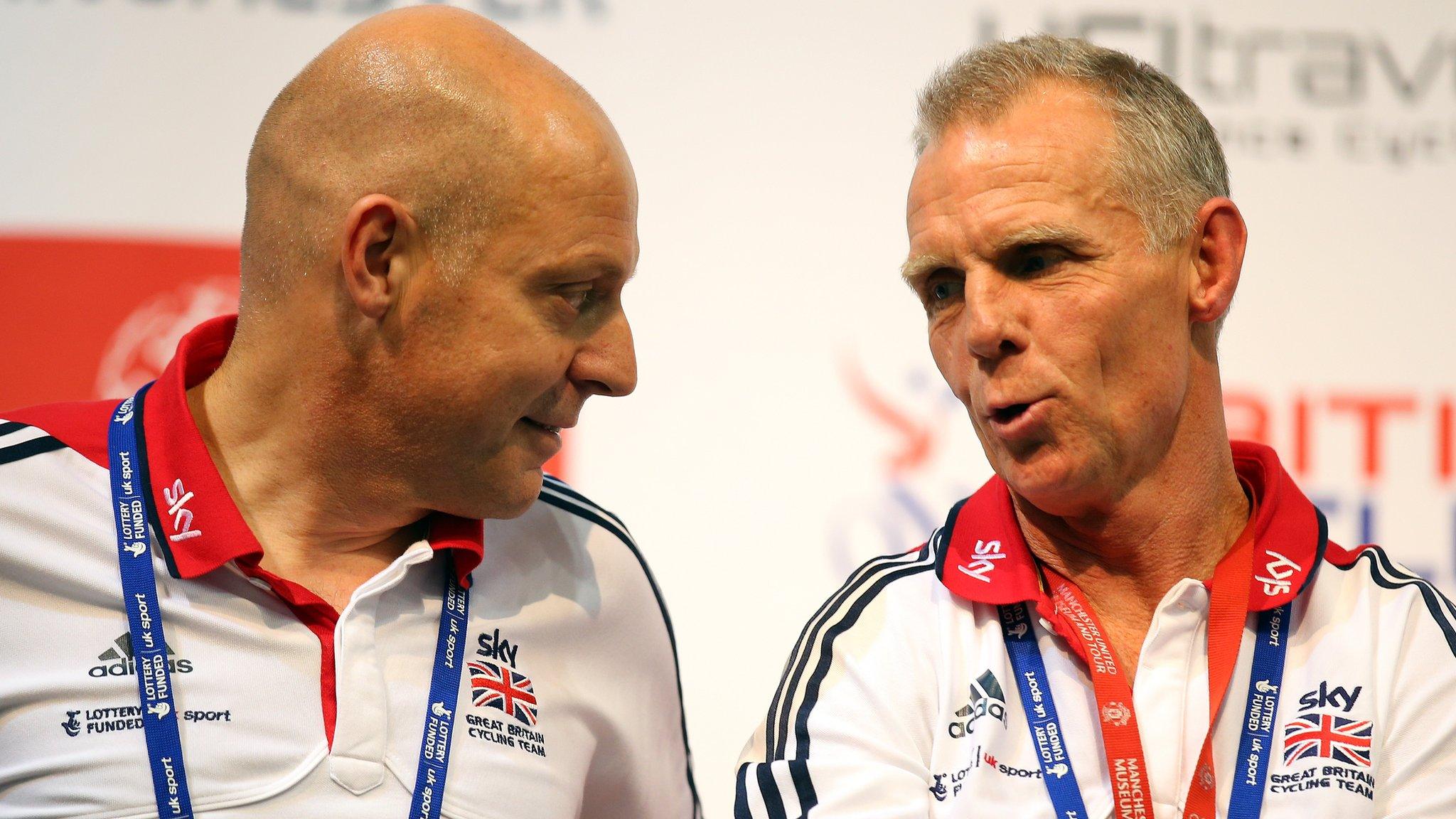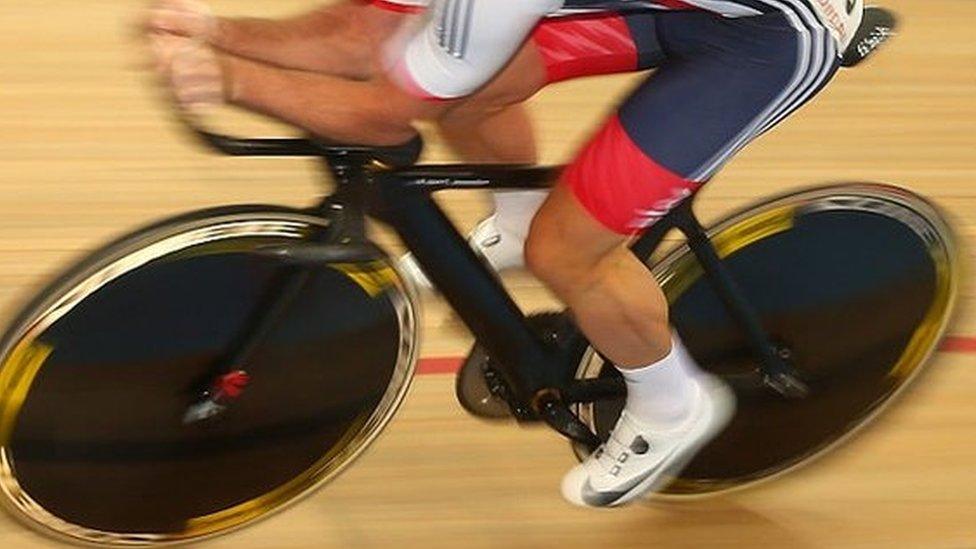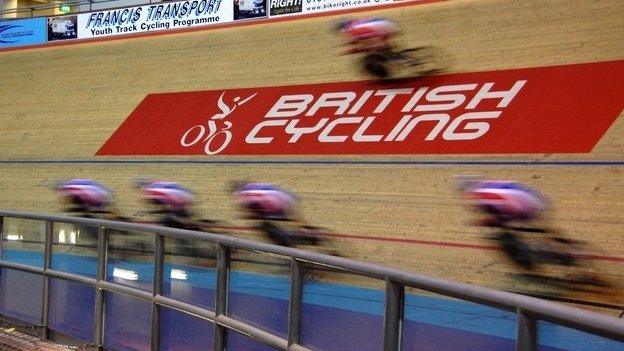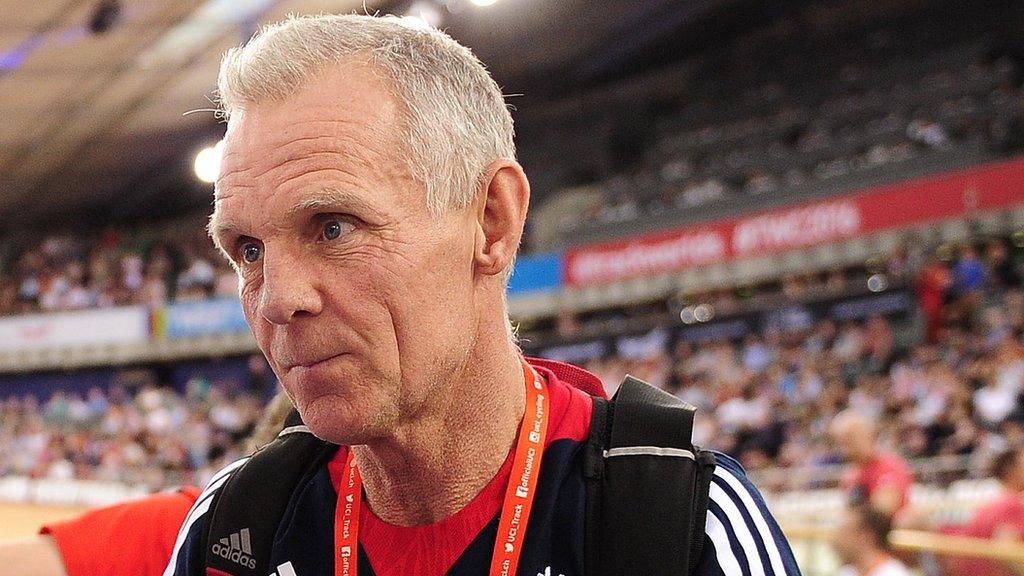British Cycling 'lacked good governance', says report into alleged bullying
- Published
Cycling report 'not a whitewash' - Phelps
A report into claims of bullying within the Great Britain cycling team has criticised British Cycling's board, former technical director Shane Sutton and funding agency UK Sport.
British Cycling lacked good governance at board level, it said.
A "culture of fear" existed within the team, according to many staff members.
The chair of the review, Annamarie Phelps, denied the long-awaited report was "a whitewash" after a more damning draft was leaked in March.
Pursuing medals and the National Lottery funding they brought from UK Sport meant addressing behavioural issues was not prioritised, the report said.
Sutton is said to have worked within a "power pocket" without real oversight.
Although he successfully coached riders to medal success, he lacked the necessary skill-set to lead the world-class programme, said the review.
Analysis
BBC sports editor Dan Roan:
To the dismay of some observers, this report is considerably less damning than a leaked draft originally suggested, with legal wrangling ensuring the 'before' and 'after' versions were very different.
But its ramifications will still extend beyond the national velodrome. After all, this is about how people were treated at the country's most successful sports team. Team GB's medal factory no less.
British Cycling was held up as a model for other governing bodies. Some big reputations have now been damaged, and important funding jeopardised. Warning signs over cycling's culture were not acted upon, raising serious questions about the oversight of UK Sport, and whether its 'money for medals' ethos was partly to blame.
And with a host of other sports becoming embroiled in duty of care controversies since this saga began, the report's findings could prove crucial in the intensifying debate about the balance between winning and welfare in British sport.
'Cycling report uncomfortable reading'
'We've changed some of the wording'
Written by a five-strong panel led by British Rowing chair Phelps, the report was commissioned 14 months ago following allegations made by ex-GB track sprinter Jess Varnish and several other former riders.
However, the report's language and some of its conclusions are significantly diluted from the draft that was written at the end of February.
That draft was leaked to the Daily Mail in March and reportedly accused the British Cycling board of being "dysfunctional", "inept" and effectively covering up an internal investigation into Varnish's claims last year.
That section in the final report, however, is much altered, although the central message is still that the panel believes the board mishandled the case and failed to follow "contractual due process".
March 2017: Varnish 'relieved truth is coming out'
After publishing the report, Phelps said at a news conference: "The panel carefully reviewed the draft in the light of new information provided to it."
That follows the Maxwellisation process - which gives those criticised the right to reply - but Phelps denied the original criticisms had been toned down.
"I don't think there's a shift in tone. I think we've been as strong. We've changed some of the wording," she said.
UK Sport chief executive Liz Nicholl said a "root-and-branch review" of culture in high-performance programmes would be carried out.
"Any suggestion that UK Sport is about a winning-at-all-costs approach is frankly disturbing and it's wrong. It never has been and it never will be," she said.
Nicholl denies win-at-all-costs approach
Published alongside the independent report was the King Review, which reported in November 2012 but was not made publicly available.
Nicholl admitted that had the funding agency pursued then British Cycling chief executive Ian Drake for the full report at the time rather than rely on his summarised version, recent events might have been avoided.
"It's a missed opportunity," she said.
British Cycling chair Jonathan Browning accepted the panel's recommendations, which centred on leadership changes, and apologised for "where we have failed or fallen short of the standards which we should have achieved."
Sports minister Tracey Couch said: "We want first class governance from all sports bodies - that is why we have made public funding conditional on adherence to the code for sports governance."
British Cycling addressing shortcomings - Browning
Other key findings from report
British Cycling failed to act on a November 2012 report which highlighted concerns over the culture within its elite programmes.
A significant number of staff within the world-class programme felt demoralised, were not offered appraisals or any form of professional development training.
Many referred to "a culture of fear" over possible retribution or losing employment for speaking out.
BMX and mountain bike riders felt like "second-class citizens" in comparison to track athletes.
Some female road riders felt disengaged.
The Paralympic programme was well run, but there was a feeling it had a lesser status because of funding.
Communication from some leadership figures towards staff and athletes was poor.
A separate financial audit found evidence of a number of instances where controls and/or policies were not correctly applied. However, it found no evidence of fraud or corruption, or misuse of UK Sport funds.
What led to the report?
An investigation started last year after claims made by Varnish and other Olympians and Paralympians.
Co-commissioned by UK Sport and British Cycling in April 2016, the report - which dealt with 108 written contributions and 45 interviews - has cost about £90,000 to put together.
It was prepared by a panel of five led by Phelps alongside former England rugby union head coach Stuart Lancaster, barrister John Mehrzad, ex-GB hockey player Annie Panter and theatre director Jude Kelly.
Initial publication was pushed back because of the number of people wanting to speak to the panel, while the legal obligation to give individuals criticised a right of reply led to further delays.
The general election, which was held on 8 June, added seven more weeks of delays.
In response to March's leak, British Cycling admitted it did not pay "sufficient care and attention" to the wellbeing of staff and athletes at the expense of winning medals.
Australian Sutton, who quit in the wake of Varnish's allegations, was found guilty of using sexist language towards her but cleared of eight of nine charges against him. He was also cleared of any bullying allegations.
Cycling is not the only British governing body embroiled in an athlete welfare controversy with inquiries into duty of care standards in bobsleigh, swimming, canoeing and taekwondo over recent months.
What has changed at British Cycling?
April 2016 - Sutton quit and was later replaced by British Sailing performance director Stephen Park.
October 2016 - Chief executive Ian Drake announced his resignation. Julie Harrington came in for Drake from the Football Association.
February 2017 - Bob Howden stepped down as chairman - though remained the organisation's president - and was succeeded by former Vauxhall chief Jonathan Browning.
March 2017 A 39-point action plan was announced, including a new code of conduct, bringing the elite programme under more central control, plus greater focus on athlete and staff development.
June 2017 - Plans outlined for an overhaul of its medical services for athletes after it was scrutinised as part of an anti-doping investigation into a mystery medical package for Team Sky cyclist Sir Bradley Wiggins in 2011.
British Cycling's board of directors is set to be replaced after the governing body called an emergency meeting for 22 July to vote on reforms.
British Cycling chairman Jonathan Browning says some of the issues within the organisation have been 'unacceptable'
- Published10 March 2017

- Published10 March 2017

- Published5 June 2017

- Published21 February 2017

- Published1 February 2017
- Published8 December 2016
